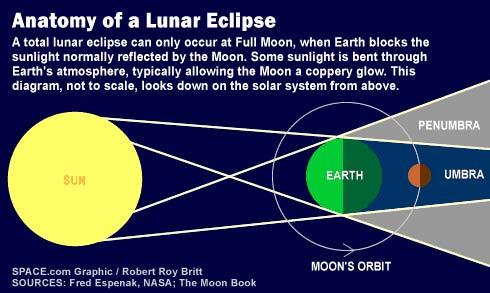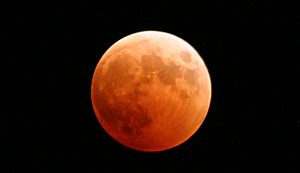When Christopher Columbus Made the Moon Disappear
The image above is what the Moon looked like, from Earth (of course), on April 15, 2014. You’ll note that it’s reddish and not nearly as bright as the moon typically is. The cause: a lunar eclipse. Lunar eclipses occur when the Sun, Earth, and Moon are aligned, as depicted in the (not-to-scale) graphic below, via Space.com. The Earth blocks most (but not all) of the sunlight which would have otherwise reflected off the Moon’s surface, leading to a dull, red sphere in the sky.

If you know what’s happening, a lunar eclipse is a really neat phenomenon — a nice example of the majesty of space visible from Earth. But if you don’t know what’s happening, a red, disappearing Moon can be terrifying.
Just ask Christopher Columbus.
As almost any U.S. school kid can tell you, Columbus sailed the ocean blue in 1492, ultimately landing in the Western Hemisphere. It wasn’t his only voyage to the other side of the world, though; he’d make three more voyages. The final one, which departed Cadiz, Spain, in 1502, ran into trouble. By June of 1503, worms had feasted on his ships, rendering the boats incapable of further seafaring. Columbus and crew were stranded on the island now known as Jamaica.
At first, the indigenous people were accommodating, offering them food and shelter. But Columbus’s crew took advantage of this hospitality, to the point of stealing (and perhaps worse). Over the ensuing months, the relationship between the Europeans and the indigenous Americans fractured, and ultimately, the Jamaican natives refused to further assist their “visitors.” Columbus wanted to regain the assistance of his formerly gracious hosts, and had an idea — he’d scare them into submission.
Columbus had been traveling with an almanac written by a German mathematician named Johannes Müller (under the Latin pseudonym Regiomontanus). The book outlined not only star charts and sunrise times, but also outlier events, such as lunar eclipses. Columbus had to adjust for the time difference between Jamaica and Germany — easier said than done, back in the day — but he figured he’d take that risk anyway. He told the indigenous people that their behavior toward his men had angered his god, and proof was coming the next night. The Moon, Columbus promised, would disappear from the sky.
Columbus correctly worked out the timetables and, as predicted, the Moon almost entirely vanished into the night sky, behind the shadow of the Earth. This wasn’t caused by Columbus’ deity of choice, of course, but by the predictable alignment of the Sun, Earth, and Moon. The native Jamaicans had no idea what was going on, and, just like Columbus had hoped, they were scared, as Science News retold:
The natives were sufficiently frightened by this unexpected occurrence and by Columbus’s uncanny prediction to beg forgiveness and appeal to him to restore their moon to the sky. Columbus responded that he wished to consult with his deity. He retired to his quarters, using a half-hour sandglass to time how long the eclipse would last. Some time later, when the eclipse had reached totality, he emerged to announce that the moon, in answer to his prayers, would gradually return to its normal brightness.
In thanks and out of fear of further mysticism, the natives again began showering the Europeans with food and supplies. A few months later, in June of 1504, a Spanish ship came in search of Columbus and his men, and — finding most of them well-fed and generally in good health — brought them home.
Bonus Fact: On January 9, 1493, Columbus was exploring the Caribbean near the Dominican Republic when, according to his logs (per History.com), he came across three mermaids. Columbus’s report, though, did not reflect well on the legendary beauty of these sea-women — he wrote that the trio were “not half as beautiful as they are painted.” Mermaids aren’t real, of course, making Columbus’s not-so-pretty discovery pretty far-fetched. Most likely, he had come across a few manatees and, not recognizing the creatures, let his imagination fill in the blanks.
From the Archives: Exit Sandman: Jamaica’s sought-after beaches — sought after by thieves, that is.
Take the Quiz: Name the Lyrics of Pink Floyd’s Song “Eclipse.”
Related: Eclipse, a board game. 4.7 stars on 126 reviews. Currently ranked #10 on BoardGameGeek.com.

